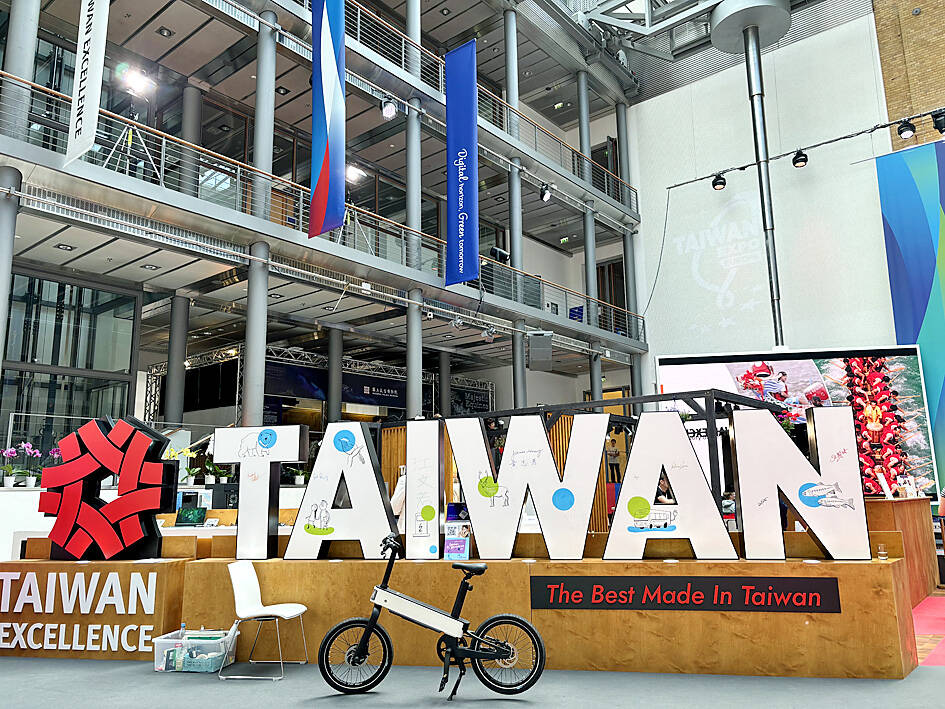The first Taiwan Expo in Europe launched on Monday in Berlin, with more than 100 Taiwanese businesses and their European counterparts seeking to cooperate, primarily in the digital sector.
The three-day expo in the German capital targets digital and “green” transition opportunities in the EU, and is estimated to generate more than US$50 million in business opportunities, said the Taiwan External Trade Development Council (TAITRA, 外貿協會), the event’s organizer.
The expo’s themes range from eco-mobility and smart healthcare to artificial intelligence (AI), TAITRA said on the event’s Web site.

Photo: CNA
TAITRA, a semi-governmental organization that promotes trade, said that the Taiwan-EU Semiconductor Forum, a side event attended by key players from among Taiwan Semiconductor Manufacturing Co’s (TSMC, 台積電) business partners, attracted about 200 participants.
At the forum, firms such as Merck KGaA, Infineon Technologies AG, MediaTek Inc (聯發科) and Realtek Semiconductor Corp (瑞昱) discussed issues ranging from semiconductor supply chain management to automotive electronics collaboration and technological innovation, TAITRA said.
International Trade Administration Director-General Cynthia Kiang (江文若) said at the expo she was optimistic about Taiwan’s role in AI development, highlighting the country’s strengths in the information and communications industry.
Realtek vice president Huang Yee-wei (黃依瑋) said that his company, which established a branch office in Munich, Germany, last year to assist clients, aimed to leverage the German automotive industry’s leading advantages in manufacturing technology and safety.
The EU is Taiwan’s largest source of foreign investment, accounting for more than one-quarter of the country’s total foreign direct investment, government data showed.
Taiwan is the EU’s 12th-largest trading partner, while the EU is Taiwan’s fourth-largest partner globally, the data showed.

When an apartment comes up for rent in Germany’s big cities, hundreds of prospective tenants often queue down the street to view it, but the acute shortage of affordable housing is getting scant attention ahead of today’s snap general election. “Housing is one of the main problems for people, but nobody talks about it, nobody takes it seriously,” said Andreas Ibel, president of Build Europe, an association representing housing developers. Migration and the sluggish economy top the list of voters’ concerns, but analysts say housing policy fails to break through as returns on investment take time to register, making the

EARLY TALKS: Measures under consideration include convincing allies to match US curbs, further restricting exports of AI chips or GPUs, and blocking Chinese investments US President Donald Trump’s administration is sketching out tougher versions of US semiconductor curbs and pressuring key allies to escalate their restrictions on China’s chip industry, an early indication the new US president plans to expand efforts that began under former US president Joe Biden to limit Beijing’s technological prowess. Trump officials recently met with their Japanese and Dutch counterparts about restricting Tokyo Electron Ltd and ASML Holding NV engineers from maintaining semiconductor gear in China, people familiar with the matter said. The aim, which was also a priority for Biden, is to see key allies match China curbs the US

NOT TO WORRY: Some people are concerned funds might continue moving out of the country, but the central bank said financial account outflows are not unusual in Taiwan Taiwan’s outbound investments hit a new high last year due to investments made by contract chipmaker Taiwan Semiconductor Manufacturing Co (TSMC, 台積電) and other major manufacturers to boost global expansion, the central bank said on Thursday. The net increase in outbound investments last year reached a record US$21.05 billion, while the net increase in outbound investments by Taiwanese residents reached a record US$31.98 billion, central bank data showed. Chen Fei-wen (陳斐紋), deputy director of the central bank’s Department of Economic Research, said the increase was largely due to TSMC’s efforts to expand production in the US and Japan. Investments by Vanguard International

STRUGGLING TO SURVIVE: The group is proposing a consortium of investors, with Tesla as the largest backer, and possibly a minority investment by Hon Hai Precision Nissan Motor Co shares jumped after the Financial Times reported that a high-level Japanese group has drawn up plans to seek investment from Elon Musk’s Tesla Inc to aid the struggling automaker. The group believes the electric vehicle (EV) maker is interested in acquiring Nissan’s plants in the US, the newspaper reported, citing people it did not identify. The proposal envisions a consortium of investors, with Tesla as the largest backer, but also includes the possibility of a minority investment by Hon Hai Precision Industry Co (鴻海精密) to prevent a full takeover by the Apple supplier, the report said. The group is